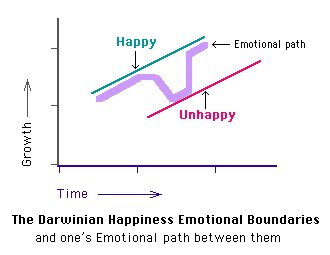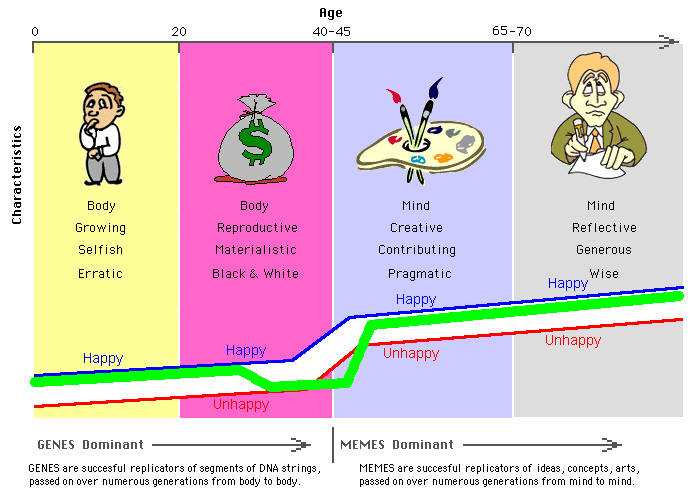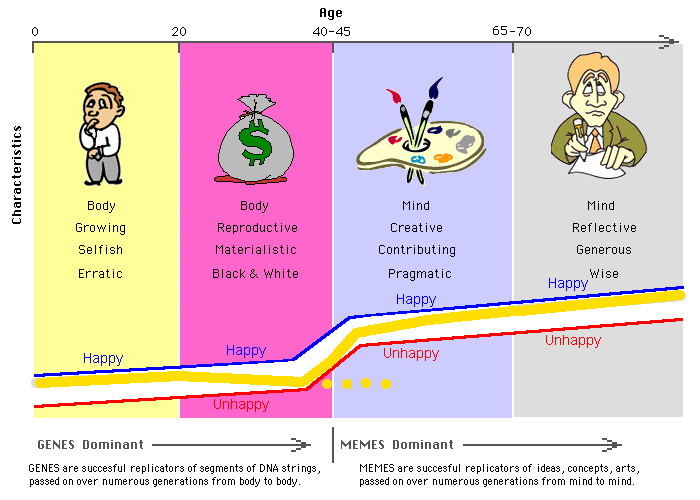10. The path of Emotional Tolerance through Life
Previous - Next - Contents
I have always maintained that you can not have a full appreciation of Peace when
you have not lived through a War.
As a child I was lucky enough not to be
exposed to any gruesome sights of dead or mutilated bodies. But I experienced plenty of
fear throughout World War 2. When it finally ended in 1945 (I was 8 then) it meant to
me :
- no longer being pulled out of bed in the middle of the night and rush down
into the underground bomb shelter which would shake with every nearby explosion and
rain dust all over you,
- no longer having to run from one man hole to the next to avoid strafing bullets
from fighter planes, while on my way to extra private German lessons with a teacher who
lived just out of town,
- and no longer hearing the dreaded air raid sirens or the frightening sound of a
bombing squadron overhead.
Peace is absolute Heaven. Although that war is 65 years behind us now, I still have (I
believe) a much greater awareness and appreciation of peace than all those who
did not have such experience in their life.
I believe that with Happiness it is very much the same thing. We do not fully
appreciate and be aware of what happiness means to us unless we have
experienced desperate unhappiness or depression.
This is where (I believe) Bjorn Grinde's findings and theory of Darwinian
Happiness comes into the picture.
We have a biological range ("zone") of
emotional tolerance within which we feel comfortable.
It is just like the range of temperatures within which we feel fine, not too hot and
not too cold. As long as we are within the comfortable range we are barely aware of it.
Only when we step outside into the freezing cold (or when the aircon suddenly packs up
in a heat wave), do we really appreciate how good it felt just before.
 I have illustrated this idea on the adjacent Diagram.
I have illustrated this idea on the adjacent Diagram.
We chuff happily along in life, not a care in the world, coasting emotionally close to
the upper "happy" boundary of our "zone of emotional tolerance".
Then
suddenly something happens which makes us very unhappy, if not depressed. Emotionally
we immediately drop down to the very lower edge of (or even below) our tolerance zone.
Here we struggle along for a while, until we finally have found a way out off our
misery, so that we start moving upwards again towards the happy side of our emotional
tolerance zone.
I believe that initially, although we can be quite happy, we are not very aware of that
fact. Only after we dive down into misery do we realise how wonderful
being happy actually is. This is the old carrot and stick approach which,
according to Grinde, is a significant aspect of our evolutionary process!
The
carrot tastes twice as good, once we have felt the stick.
Therefore once we have had one bad experience with the stick (becoming very unhappy or
even depressed) we become at once very motivated to stay well away from that stick in
the future!
I have combined this idea with my four phases of life. In the Diagram below I
have attempted to illustrate the real life experience I personally had.
 I was coasting along quite happily during my earlier life, through school, university
and my early years of marriage.
I was coasting along quite happily during my earlier life, through school, university
and my early years of marriage.
Then, at age 29, shortly after starting my first
job as
a geologist in Australia, things went downhill rapidly. I simply could not work within
the confines of a company. I felt my freedom impaired, and my thoughts and sense of
purpose confined within narrow boundaries, which seriously restricted my creativity.
I went from one job to another over a period of about 14 years, struggling along
right on the unhappy edge of my emotional tolerance zone, then went even below that
into the area of sustained depression (not, I believe, a chronic illness but an
emotional reaction to an intolerable situation in my life!)
 When I got into my 40s I reached the big watershed in life, where the biological
pressures of producing and gearing offsprings declines, and our desire for creative
expression and thought takes over, the situation exploded.
When I got into my 40s I reached the big watershed in life, where the biological
pressures of producing and gearing offsprings declines, and our desire for creative
expression and thought takes over, the situation exploded.
My mid life crisis hit,
boy did I experience that one ! I left my marriage, quit my job, then started to study
music. I studied music (saxophone and piano) fanatically 10-13 hours a day, 5
days a week, for 6 solid years.
Of course my main motivation was to get
established, one way or the other, in music. But there was also that stick : I
never, ever, wanted to go back to where I had been : in a job I did not wanted,
depressed beyond belief!
So there it was, that stick, spurning me on towards a
life of happiness. And I have succeeded wonderfully.
But believe me, ever since
those days, I have been, and still am right now, acutely aware of my unhappy past, and
I guard and protect my present happiness like a mother protects her favourite child!!
I look at all 7 factors which determine my happiness, but
these days especially at my sense of purpose and the thoughts that feed
it. Looking ahead and planning new projects is an important part of that. Enjoying the
right environment and staying healthy too, are always in the back of my mind. That's
how you stay happy ! You have to work at it !
How about you, dear reader ? Are you happy ? No ?
Then let me advise you !
Don't look at your unhappiness as a negative, but as an
opportunity,. An opportunity to change your life !
If, at least at one time in your life, you will be lucky enough (yes, in one sense
that is true) to strike a really bad time. That will be the moment that you
realise what happiness is really about. When that happens: don't stuff around !
Remember that you have (as far as we know) only one life to live. Determine what
is bothering you, and change !
The Diagram below shows an example of the typical mid life crises many men
suffer, but an unhappy event like this may of course occur in anyone's life (male or
female) at any time.

The bottom line is very simple : you either go on as you are and follow the dotted line
towards endless unhappiness (you have to live with), or you do something about it and
change your life towards a degree of happiness or contentment. We all
have to live our own life and are responsible
for it.
It is also worth remembering that, according to Bjorn Grinde's findings, our own personal happiness will contribute in a very small way, towards a happier and therefore
better humanity in the future.
Next Page -
Top of Page
Copyright © 2011 Michael Furstner
|
 I have illustrated this idea on the adjacent Diagram.
I have illustrated this idea on the adjacent Diagram. I was coasting along quite happily during my earlier life, through school, university
and my early years of marriage.
I was coasting along quite happily during my earlier life, through school, university
and my early years of marriage.
